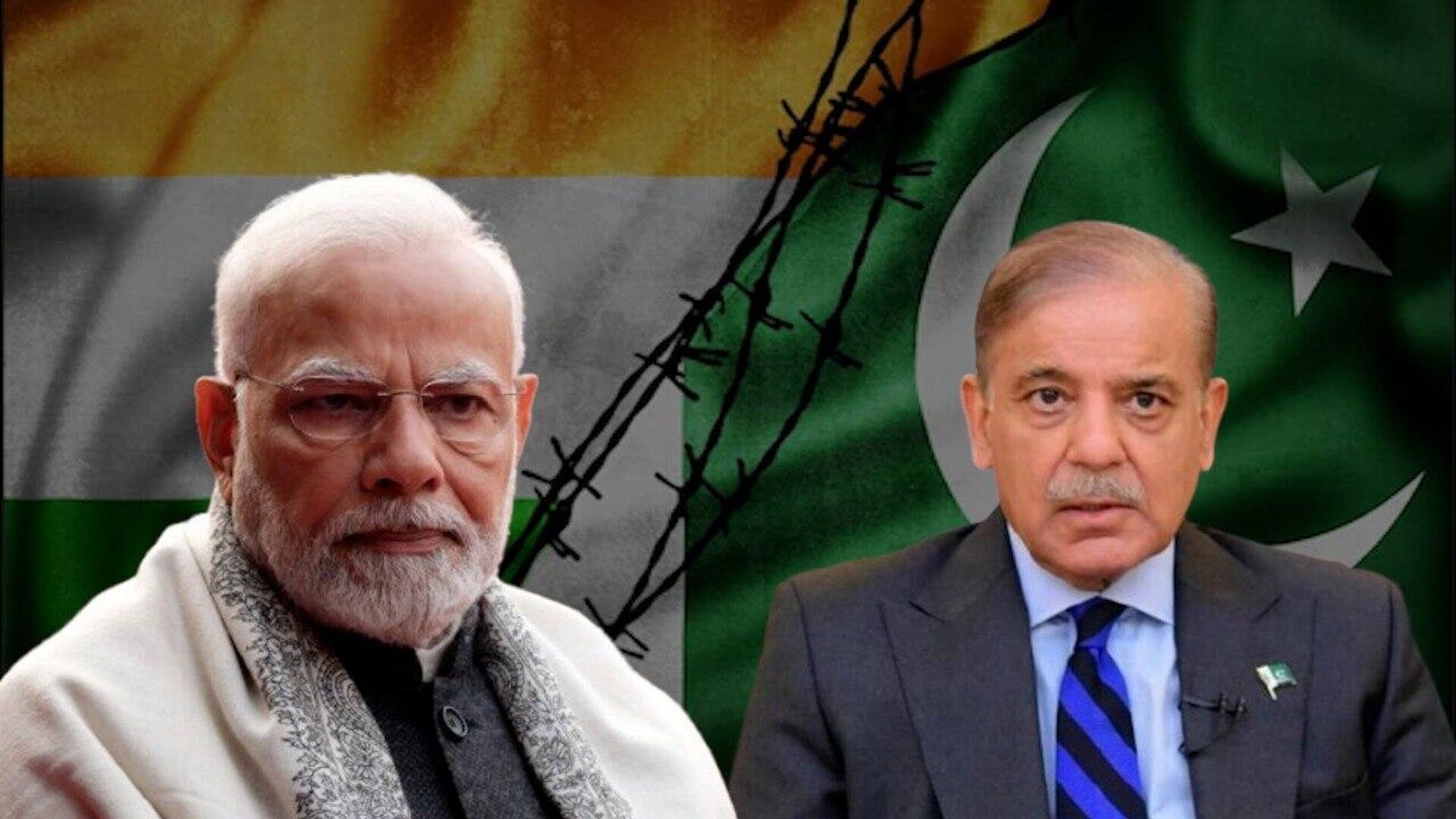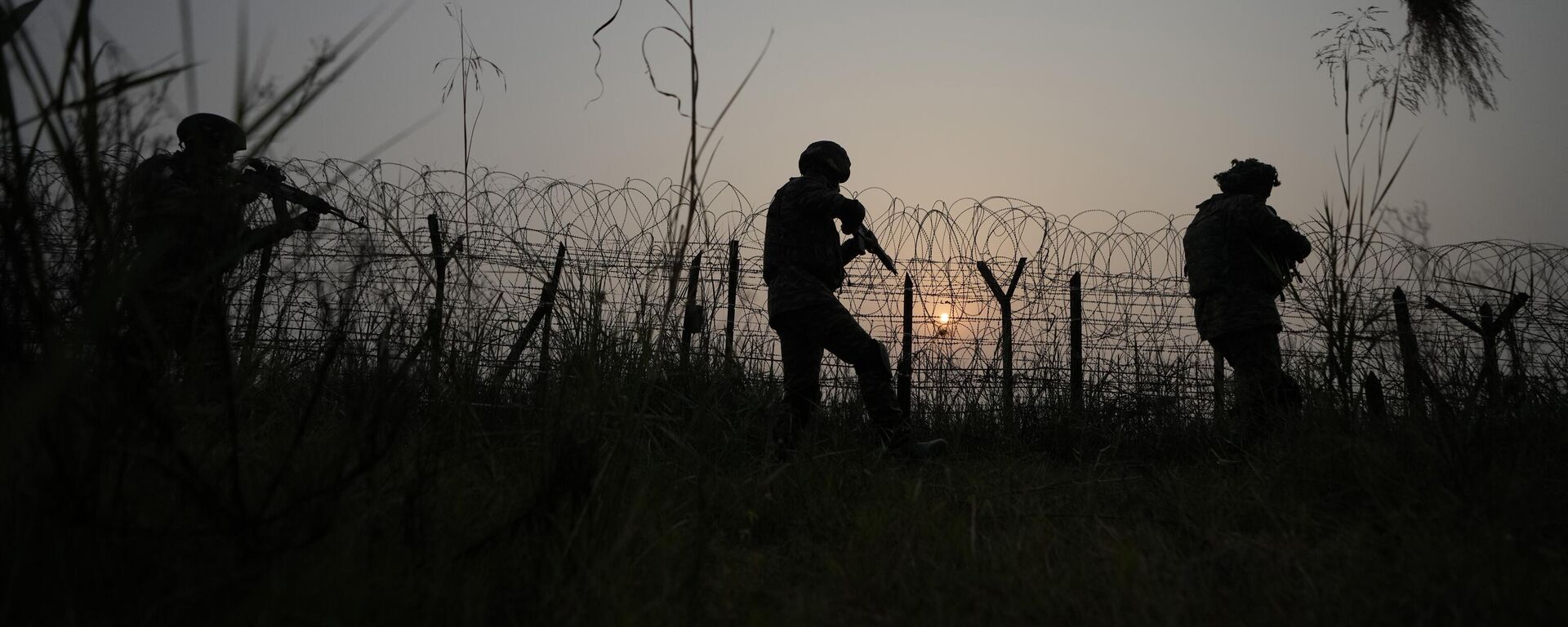Can India and Pakistan De-escalate Tensions?

© Sputnik
Subscribe
Iranian Foreign Minister Seyed Abbas Araqchi and Saudi Arabian Minister of State for Foreign Affairs Adel Aljubeir held separate talks with External Affairs Minister S Jaishankar in New Delhi on Thursday. Both Iran and Saudi Arabia have called on India and Pakistan to de-escalate tensions.
India's External Affairs Minister S Jaishankar held talks with Iranian Foreign Minister Seyed Abbas Araqchi in New Delhi on Thursday. Araqchi, who visited Islamabad this week, has offered to mediate between the two nations to de-escalate tensions.
Delivering his opening remarks at the 20th India-Iran Joint Commission Meeting (JCM) at New Delhi's Hyderabad House on Thursday, Jaishankar told the Iranian Foreign Minister that New Delhi was “compelled” to respond to the Pahalgam terrorist attack by targeting nine locations in Pakistan-administered Kashmir and mainland Pakistan on Wednesday.
Delivering his opening remarks at the 20th India-Iran Joint Commission Meeting (JCM) at New Delhi's Hyderabad House on Thursday, Jaishankar told the Iranian Foreign Minister that New Delhi was “compelled” to respond to the Pahalgam terrorist attack by targeting nine locations in Pakistan-administered Kashmir and mainland Pakistan on Wednesday.
"It is not our intention to escalate this situation. However, if there are military attacks on us, there should be no doubt that it will be met with a very very firm response. As a neighbour and close partner, it is important that you have a good understanding of this situation," Jaishankar told Araqchi.
The top Indian diplomat stressed that New Delhi's counter-terror precision strikes, christened as Operation Sindoor, were "targeted and measured".
At a presser on Thursday, Foreign Secretary Vikram Misri said that the Pahalgam terrorist attack was the "original escalation", which was responded to by India through the precision strikes on 7 May.
At a presser on Thursday, Foreign Secretary Vikram Misri said that the Pahalgam terrorist attack was the "original escalation", which was responded to by India through the precision strikes on 7 May.
"Our intention is not to escalate... But any further action by Pakistan will be and is being responded to in the same domain," Misri said.
Misri told the presser that the desire of the global community- be it the West Asian nations or the Permanent Members of the United Nations Security Council (UNSC)- was to "de-escalate" tensions, as evidenced from the statements issued by various governments. He also said that the global community was at large supportive of India's right to "defend itself" from terrorism.
In the aftermath of the precision strikes, a government source told Sputnik India that senior Indian officials had also spoken to their counterparts from Russia, the US, Saudi Arabia, the United Arab Emirates (UAE) and the United Kingdom (UK) to convey New Delhi's position. India has said that its actions have been "measured, responsible and designed to be non-escalatory in nature", targeting only terrorist infrastructure rather than civilian, economic or military targets.
Indian officials have said that around 24 precision strikes launched between 1 and 1:30 AM on Wednesday at nine Pakistani locations, all of them targeting terror infrastructure belonging to banned terror groups - Lashkar-e-Taiba (LeT*), Jaish-e-Mohammad (JeM*) and Hizbul Mujahideen (HM*) - left over 100 "terrorists" dead, which has been contested by Islamabad.
Amid global calls for exercising restraint, including from US President Donald Trump, Pakistan Prime Minister delivered a special address to the public vowing revenge for Indian strikes. Sharif said that Pakistan would fight "till the last drop of blood".
On Thursday, the Indian Defence Ministry reported that Indian air-defence systems shot down Pakistani missiles and Unmanned Aerial Vehicles (UAV) over 11 Indian cities all along the India-Pakistan International Border (IB) and Line of Control (LoC)-- Awantipora, Srinagar, Jammu, Pathankot, Amritsar, Kapurthala, Jalandhar, Ludhiana, Adampur, Bhatinda, Chandigarh, Nal, Phalodi, Uttarlai and Bhuj.
In the aftermath of the precision strikes, a government source told Sputnik India that senior Indian officials had also spoken to their counterparts from Russia, the US, Saudi Arabia, the United Arab Emirates (UAE) and the United Kingdom (UK) to convey New Delhi's position. India has said that its actions have been "measured, responsible and designed to be non-escalatory in nature", targeting only terrorist infrastructure rather than civilian, economic or military targets.
Indian officials have said that around 24 precision strikes launched between 1 and 1:30 AM on Wednesday at nine Pakistani locations, all of them targeting terror infrastructure belonging to banned terror groups - Lashkar-e-Taiba (LeT*), Jaish-e-Mohammad (JeM*) and Hizbul Mujahideen (HM*) - left over 100 "terrorists" dead, which has been contested by Islamabad.
Amid global calls for exercising restraint, including from US President Donald Trump, Pakistan Prime Minister delivered a special address to the public vowing revenge for Indian strikes. Sharif said that Pakistan would fight "till the last drop of blood".
On Thursday, the Indian Defence Ministry reported that Indian air-defence systems shot down Pakistani missiles and Unmanned Aerial Vehicles (UAV) over 11 Indian cities all along the India-Pakistan International Border (IB) and Line of Control (LoC)-- Awantipora, Srinagar, Jammu, Pathankot, Amritsar, Kapurthala, Jalandhar, Ludhiana, Adampur, Bhatinda, Chandigarh, Nal, Phalodi, Uttarlai and Bhuj.
"The debris of these attacks is now being recovered from a number of locations that prove the Pakistani attacks," according to statements from the Indian Defence Ministry and Foreign Secretary Misri.
Since Wednesday, the Indian authorities have also accused Pakistan of increasing the intensity of "unprovoked firing" along LoC using mortars and heavy calibre artillery in Kupwara, Baramulla, Uri, Poonch, Mendhar and Rajouri sectors of Jammu and Kashmir. The Ministry of External Affairs (MEA) said that the shelling has left at least 13 Indians dead and caused nearly 60 injuries.
In response to Pakistan actions, India has targeted the air defence radars and systems at a number of Pakistani locations. Foreign Secretary Misri said that India has effectively "neutralised" the air defence systems over Lahore.
Amid global calls for de-escalation, former Indian Ambassador (retired) Anil Trigunayat told Sputnik India that any plan to de-escalate tensions should essentially involve a premise that Pakistan “abdicates its support for cross-border terrorism”.
In response to Pakistan actions, India has targeted the air defence radars and systems at a number of Pakistani locations. Foreign Secretary Misri said that India has effectively "neutralised" the air defence systems over Lahore.
Amid global calls for de-escalation, former Indian Ambassador (retired) Anil Trigunayat told Sputnik India that any plan to de-escalate tensions should essentially involve a premise that Pakistan “abdicates its support for cross-border terrorism”.
Nevertheless, Trigunayat said that India did appreciate the mediation efforts of Iran and Saudi Arabia, or other countries for that matter.
“But it is expected that they will focus on the root causes than temporary fixes and solutions. We can’t have an ostrich attitude,” Trigunayat concluded.


